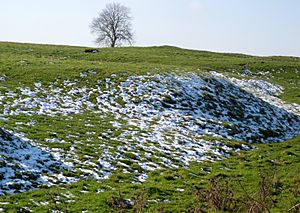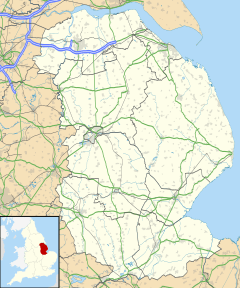Calcethorpe facts for kids
Quick facts for kids Calcethorpe |
|
|---|---|
 Earthworks at Calcethorpe deserted medieval village |
|
| Population | 70 (2001 census) (with Kelstern) |
| OS grid reference | TF248887 |
| • London | 130 mi (210 km) S |
| Civil parish |
|
| District | |
| Shire county | |
| Region | |
| Country | England |
| Sovereign state | United Kingdom |
| Post town | Louth |
| Postcode district | LN11 |
| Police | Lincolnshire |
| Fire | Lincolnshire |
| Ambulance | East Midlands |
| EU Parliament | East Midlands |
| UK Parliament |
|
Calcethorpe is a small, quiet place in Lincolnshire, England. It's known as a hamlet, which is a tiny village. But Calcethorpe is special because it's also a "deserted medieval village" (DMV). This means it was once a busy village long ago, but then everyone left, and it became empty. Today, you can still see clues of the old village on the ground!
Calcethorpe is located about 5 miles (8 kilometers) west of the town of Louth. It sits within the beautiful Lincolnshire Wolds, which is a special area known for its natural beauty.
A Village Through Time
Calcethorpe has a very long history. It was even mentioned in the famous Domesday Book in 1086. This book was a huge survey ordered by William the Conqueror to record everything in England. Back then, Calcethorpe had only two households and a small area of meadow.
In 1971, the area of Calcethorpe had a population of just 27 people. Later, in 1987, the parish (a local administrative area) of Calcethorpe joined with a nearby place called Kelstern. Together, they formed the new parish of "Calcethorpe with Kelstern".
The Lost Church
Long ago, Calcethorpe had its own church. It was dedicated to a saint named Saint Faith. However, by about 1450, the church had fallen apart and disappeared. This was around the same time that the rest of the village became deserted.
Today, you can still find signs of the old village. Near Manor Farm, there are special marks on the ground called earthworks. These are like ancient bumps and hollows that show where buildings used to be. Locals call this area 'Priests Close', and it's probably where the old church once stood.


